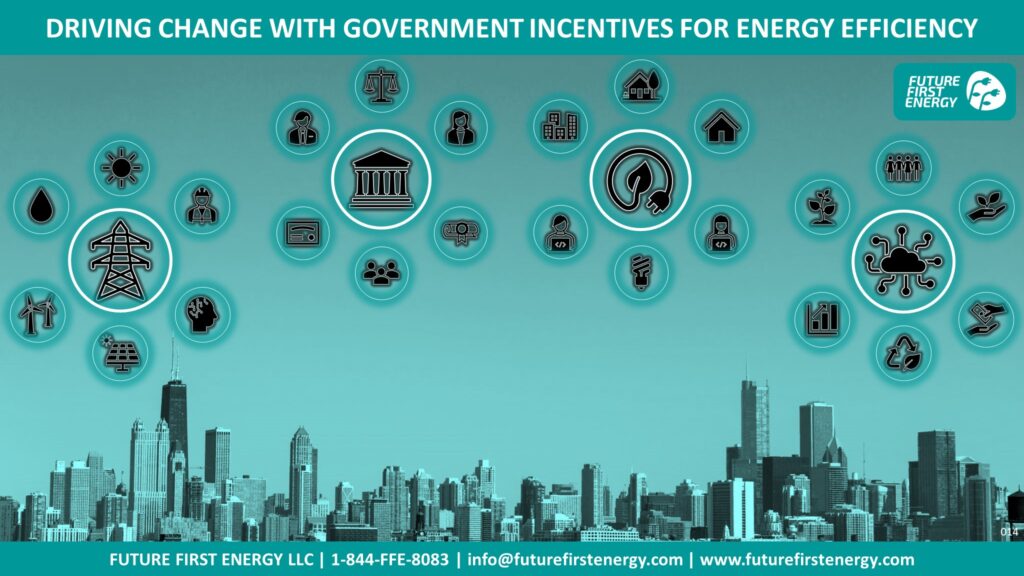In the pursuit of a sustainable future, governments worldwide are playing a pivotal role by championing energy efficiency initiatives through a range of incentives. These initiatives not only accelerate the adoption of energy-efficient technologies but also inspire businesses and individuals to embrace sustainable practices. In this article, we’ll explore the transformative impact of government incentives for energy efficiency and how they drive positive change for a greener and more sustainable world. Let’s bridge the gap to a brighter future with the support of visionary policies. 🏛️💡🌱
#EnergyEfficiency #SustainablePolicies #GovernmentIncentives #InnovationsForTomorrow #EnergyEfficiency
1. Tax Incentives: A Win-Win for Businesses and Environment
Governments offer tax incentives to businesses that invest in energy-efficient technologies and practices. These incentives include tax credits, deductions, and accelerated depreciation, encouraging companies to reduce their energy consumption and operational costs while bolstering environmental stewardship.
2. Energy-Efficient Building Codes: Paving the Way for Sustainability
Mandating energy-efficient building codes is a powerful tool for governments to drive energy efficiency in the construction industry. These codes set standards for building design, insulation, lighting, and HVAC systems, ensuring that new buildings are energy-conscious and eco-friendly.
3. Rebate Programs: A Reward for Sustainable Choices
Rebate programs offer financial incentives to individuals and businesses when they purchase energy-efficient appliances, equipment, and vehicles. These programs promote the adoption of eco-conscious technologies and enable consumers to save money while contributing to environmental preservation.
4. Grant Programs: Funding Sustainability Solutions
Governments provide grants to support research, development, and implementation of energy efficiency projects. These grants empower businesses, organizations, and communities to undertake innovative projects that advance energy efficiency and sustainability.
5. Energy Audits and Consultations: Empowering Knowledge
Some governments offer free or subsidized energy audits and consultations to help businesses and homeowners identify energy-saving opportunities. These audits provide valuable insights into potential efficiency improvements and the benefits of adopting sustainable practices.
6. Demand Response Programs: Balancing Energy Consumption
Demand response programs encourage businesses and consumers to reduce electricity usage during peak demand periods. By participating in these programs, energy users contribute to grid stability, energy conservation, and the integration of renewable energy sources.
7. Performance-Based Incentives: Driving Continuous Improvement
Performance-based incentives reward businesses based on achieved energy savings or reduced emissions. These incentives motivate organizations to continuously improve their energy efficiency practices, contributing to long-term sustainability goals.
8. Public Awareness Campaigns: Inspiring Collective Action
Governments engage in public awareness campaigns to educate citizens about the benefits of energy efficiency and the available incentives. These campaigns foster a sense of responsibility among individuals and businesses, inspiring collective action towards a sustainable future.
Conclusion: Building a Sustainable Legacy
Government incentives for energy efficiency serve as a bedrock for building a sustainable legacy. By collaborating with businesses and individuals, governments pave the way for transformative change that reduces carbon emissions, conserves resources, and enhances economic prosperity. As we bridge the gap between visionary policies and sustainable practices, let us unite in the collective effort towards a brighter and more sustainable future. 🌟🏛️🌍
Share your thoughts and experiences on government incentives for energy efficiency in the comments below. Together, let’s drive positive change and inspire a global movement towards a greener and more sustainable tomorrow. 💚💡🌱
#EnergyEfficiency #SustainablePolicies #GovernmentIncentives #InnovationsForTomorrow
